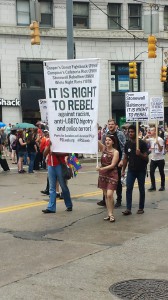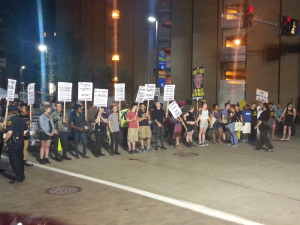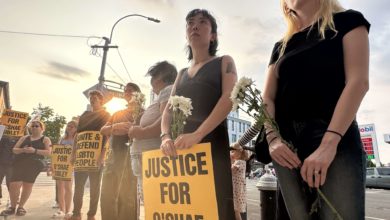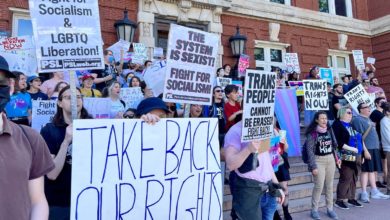 For the second year in a row, Pittsburgh’s annual Pride celebration generated national controversy. This year’s controversy centered around the choice of entertainer for the event: the Delta Foundation of Pittsburgh, a non-profit organization that has organized Pride since 2007, chose Iggy Azalea to headline the Pride in the Street fundraiser concert. The decision sparked outrage in the oppressed communities of Pittsburgh due to her well-documented racist A and anti-LGBTQ statements. Azalea eventually canceled her appearance due to the massive public outcry, but the performer was only a catalyst that brought years of simmering frustration and anger to the surface.
For the second year in a row, Pittsburgh’s annual Pride celebration generated national controversy. This year’s controversy centered around the choice of entertainer for the event: the Delta Foundation of Pittsburgh, a non-profit organization that has organized Pride since 2007, chose Iggy Azalea to headline the Pride in the Street fundraiser concert. The decision sparked outrage in the oppressed communities of Pittsburgh due to her well-documented racist A and anti-LGBTQ statements. Azalea eventually canceled her appearance due to the massive public outcry, but the performer was only a catalyst that brought years of simmering frustration and anger to the surface.
The real target of this outrage however was the growing depoliticization of Pride, which originated as a celebration of the heroic 1969 Stonewall uprising against police terrorism led by militant and organized LGBTQ people of color that brought the struggle into the streets. Roots Pride grew out of this widespread criticism as an alternative Pride celebration to the whitewashed and increasingly exclusive mainstream Pride commandeered by big businesses and bourgeois politics.
Delta Foundation in context
Local entrepreneurs established the Delta Foundation to raise funds mainly through high-class parties and events at exclusive night clubs, ostensibly to benefit the Pittsburgh LGBTQ community. From $40+ street concert tickets to $450 per non-profit for a table, Delta has transformed Pittsburgh Pride from a free event to one of the most expensive Pride celebrations to participate in, pricing out many of the most oppressed in the LGBTQ community. In return, Delta has given back to the LGBTQ just two percent of its yearly revenue in grants and awards – an amount just slightly higher than its expenditure on shirts. By its own admission, Delta was slated to pay this year’s Pride headliner $150,000 but has only given a total of $75,000 to various LGBTQ organizations over the past seven years.
Several other controversies show the class nature of the Delta Foundation. Delta left staffers for its LGBTQ magazine “Equal” unpaid when they shuttered it without notice in late 2014, leaving Pittsburgh without an LGBTQ publication for the first time in decades. Delta has also repeatedly refused to hire unionized stagehands at Pride or to even meet with International Alliance of Theatrical Stage Employees Local 3. Finally, Delta refused to challenge the city or the police department after an internal review exonerated the Pittsburgh police officer who savagely attacked a 19-year old lesbian for arguing with anti-LGBTQ bigots at PrideFest 2014. The million-dollar-per-year non-profit appears to be more interested in planning parties and generating revenue than in advancing LGBTQ struggles in Pittsburgh.
Roots Pride and the Pride march
Roots Pride kicked off with a town hall meeting on June 11 attended by over 100 people, one of the first of its kind in the city’s history. A diverse group of panelists explained why a movement to take back Pride was necessary. Beyond anger at the choice of performer and Delta’s practices, panelists pointed to the daily realities for oppressed communities not only in Pittsburgh, the so-called “most livable city in America,” but across the country – ongoing systemic exclusion from employment, health care, and housing; gentrification pricing people out of their homes and neighborhoods; and constant vulnerability to threats of violence. Panelists explained that this multi-faceted war on oppressed communities especially affects the LGBTQ communities of color, making community building difficult but imperative for ending these systemic oppression. As one of the panelists TJ Hurt expressed, “solidarity is a threat to the system.”
June 13 was the Pride in the Streets concert. About 30 people from Roots Pride and the Party for Socialism and Liberation (PSL) stood in a line to block out a pair of religious anti-LGBTQ bigots and bring back to Pride the political messages that rebellion against bigotry is justified and that all LGBTQ people across the country need full equal rights now. The group chanted “Pride is political – our lives matter” and “Trans lives matter!” Protesters held placards with a variety of messages: “Trans rights now!” “Workers rights are LGBTQ rights!” “From Stonewall to Baltimore: it is right to rebel!” “and “Stonewall means fight back!”
Concert-goers were very supportive and frequently took pictures with demonstrators and their signs. Afterwards, the protesters marched through the streets of downtown Pittsburgh to a Roots Pride dance party carrying a banner and signs which all read “Pride is political.”
Julia Johnson of the local Black Lives Matter movement expressed the protesters’ frustration with Delta’s toleration of and lack of response to anti-LGBTQ bigots: “Where is Delta? They’re [at the concert] making money while we are barraged with hate and vile bigotry! Where are when we are in need?”
The day after was the Pride march. Over 130 groups and thousands of people – diverse across nationality, gender, and sexuality but united in being working-class – turned out to watch and participate in the march. Due to the outrage towards Delta, a number of progressive organizations dropped out of the Pride march in protest and sent statements of solidarity to Roots Pride. While the PSL acted in solidarity with the efforts of Roots Pride, it remained a contingent in the march to be a revolutionary voice for Pride’s political roots in the struggle for equality and resistance to racism and anti-LGBTQ bigotry. People along the march route enthusiastically joined in chants such as “What do we want? Equality! When do we want it? Now!” and “Gay, straight, Black, white – marriage is a civil right!” In fact, the roller derby squad behind the PSL contingent in the march led a call-and-response chant with the PSL: “We are strong, we are united – we are strong and united! United we will win!”
The response the PSL received is testimony to the fact that with a clear political message, it is possible to politicize people and unite them behind concrete political objectives – an absolute necessity if we are going to uproot this system of oppression and exploitation as soon as we can.






